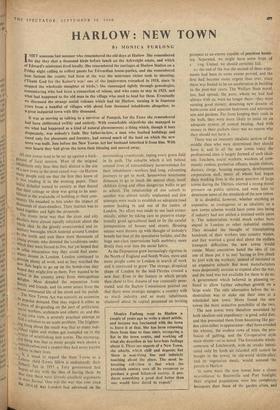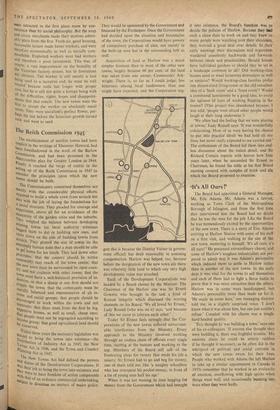HARLOW: NEW TOWN
By MONICA FURLONG
IMET someone last summer who remembered the old days at Harlow. She remembered the day they shot a thousand birds before lunch on the Arkwright estate, and which of Edward's mistresses lived locally. She remembered the carriages at Harlow Station on a Friday night calling to collect guests for Edwardian house-parties, and she remembered how furious the county had been at the way the nouveaux riches took to shooting. ('Thank God for the Kaiser's war,' one of the landowners remarked in 1918. since 'it stopped the wholesale slaughter of birds.') She rummaged tightly through genealogies, remembering who had been a connection of whom, and who came to stay in 1925, and what had happened to the old man in the village who used to load for them. Eventually we discussed the strange social volcano which had hit Harlow, turning it in fourteen years from a handful of villages with about four thousand inhabitants altogether, to a great industrial town with fifty thousand.
It was as moving as talking to a survivor of Pompeii, for the Essex she remembered had been obliterated swiftly and entirely. With remarkable objectivity she managed to see what had happened as a kind of natural phenomenon; a thing which, though it hurt desperately, was nobody's fault. Her father-in-law, a man who loathed buildings and cared only for pheasants and forestry, had owned much of the land on which the new town was built. Just before the New Towns Act her husband inherited it from him. With sore hearts they had given the town their blessing and moved away.
All new towns tend to be set up against a back- 1"411nd of local tension. Most of the original inhabitants only hear that their district is the site of a new town in the most casual way—in Harlow many People told me that the first they knew of "t Was reading it in the evening paper. Their '4441 disbelief turned to anxiety as they feared that their cottage or shop was going to be anni- hilated in the avalanche of building or their corn- :11,4/14Y life smashed to bits under the impact of thousands of slum-dwellers. Their instinct was to band together and fight the proposals. , The ironic twist was that the slum and city dwellers were almost equally reluctant about the whole idea. In the grossly overcrowded and in- sanitary boroughs which festered around London to the north and east there were thousands of young parents who detested the-conditions under in they were forced to live, but yet hoped that jr some miraculous way they could find some- ' where decent in London. London continued to Provide plenty of work, and as they watched the .rlew fiats begin to go up on the bomb-sites they hnoPed they might live in them. Few wanted to be tailed in the country away from metropolitan delights. Most dreaded the separation from family and friends, and (in some areas) from the wa.,r41, communal life of the street and the parish. t 1 ne New Towns Act was scarcely an accession ° Popular demand. One may regard it either as oPiece of do-gooding on the part of politicians, vial workers, architects and others; or, and this i my own view, a severely practical attempt to a solution to an acute problem. The frighten- v411 thing about the result was that so many Jeldnal rights and wishes got trampled on in the °I:I/se of establishing new towns. The encourag- 'eug thing was that so many people were shown a L°Iisideration and a respect they had never known before in their lives. , It is usual to regard the New Towns as a fl-abour child (Lewis Silkin is undoubtedly their bather); but in 1937 a Tory government had that to toy with the idea of having them. At nat time there were already excellent arguments their favour. One was the way that ever since "le 1914-18 war London had advanced on the surrounding countryside, raping every green field in its path. The suburbs which it left behind created lives of extraordinary inconvenience for their inhabitants—workers had long, exhausting journeys to get to work, housewives wearisome distances to go to reach the nearest shop, small children tiring and often dangerous Walks to get to school. The relationship of one suburb to another was almost totally unplanned and few attempts were made to establish an adequate road system leading in and out of the centre of London. No effort was made to use land econo- mically, either by taking care to preserve excep- tionally good agricultural land or by the careful juxtaposition of houses and streets. Housing estates were thrown up with thought of nobody's benefit but that of the speculative builder, and the huge one-class reservations built snobbery more firmly than ever into the social fabric.
As the Depression grew increasingly rigorous in the North of England and South Wales, more and more people cattle to London in search of work and it continued to grow. The strange, dropsical shape of London by the mid-Thirties created a new fear. Even in the fantasy in which people then chose to live, dreams of war constantly pene- trated, and the Barlow Commission pointed out that there were strategic dangers; a country with so much industry and so many inhabitants- clustered about its capital presented an inviting Monica Furlong went to Harlow a couple of years ago to write a short article, and became too fascinated with the town to leave it at that. She has been returning there from time to time since, occupying a fiat in the town centre, and working off what she describes as her love-hate feelings about it. There are aspects of a New Town, she admits, which chill and depress; but 'there is som2thing fine and infinitely touching about the place. The most in- teresting reficelion is that when the twentieth century uses all its resources to produce a good balanced society, it pro- duces something a good deal better than one would have dared to expect' prospect to an enemy capable of precision bomb- ing Separated, we might have some hope of s ling. United, we should certainly fall.
r.,v the end of the war the second of these argu- ments had been to some extent proved, and the first had become more urgent than ever, since there was bound to be an acceleration in building in the post-war years. The Welfare State mood, too, had spread; the poor, whom we had had always with us, were no longer there—they were earning good. money, dreaming new dreams of bathrooms and separate bedrooms and television sets and gardens. Far from keeping their coals in the bath, they were more likely to insist on an adequate system of central heating. And with money in their pockets there was no reason why they should not have it.
There was an intensely idealistic section of the middle class who were determined they should have it, and in all the new towns today the professional class is largely formed of such ideal- ists. Teachers, social workers, wardens of com- munity centres, probation officers, health visitors, doctors, clergy, housing managers, development corporation staff, many of whom had begun their Working lives in the poor quarters of large towns during the Thirties, exerted a strong moral pressure on public opinion, and were later to determine some of the standards of the new towns.
It is, doubtful, however, whether anything as expensive, as courageous or as idealistic as a new towns scheme would have come into being if industry had not smiled a strained smile upon it. The industrialists would much rather. have stayed in London or other industrial centres. They dreaded the thought of transplanting hundreds of their workers into country wastes, and they worried a good deal about the endless transport difficulties the new towns would create. Many executives hated the idea of (as one of them put it to me) 'having to live cheek by jowl with the workers,' instead of insulated in an expensive suburb. But most manufacturers were desperately anxious to expand after the war, and the land was not available for them to do so. A government which believed in planning re- fused to allow further suburban growth on a large scale. The only alternative before the in- dustrialists was to stake out their sites at a scheduled new town. Many found the new towns the more seductive possibility of the two.
The new towns were therefore nourished by both idealism and expediency—a good, solid diet; and this prevented them from becoming like gar- den cities either in appearance—they have avoided the whimsy, the endless rows of trees, the pro- fusion of gabling, and the Co-operative style main streets—or in mood. The formidable whole- someness of Letchworth, with its cranks intoxi- cated only by fresh air (alcohol still cannot be bought in the town), its old-world skittle-alley, and, its vegetarian meals, would astound the people in Harlow.
In some ways the new towns bear a closer resemblance to Bournville and Port Sunlight; their original populations were less completely bourgeois than those of the garden cities, and were attracted in the first place more by con- venience than by social philosophy. But the soap and cocoa merchants made their motives admir- ably plain from the first. Fresh air, good housing, reasonable leisure made better workers, and were therefore economically as well as morally com- mendable. Exploited worker's were bad workers and therefore a poor. investment. This was, of course, a vast improvement on the brutality of the Victorian factory system, but its limitations are obvious. The worker is still merely a tool being used to a lucrative end; he must be well treated because tools last longer with proper care, but he is still not quite a human being with all the difficulties, rights, hopes and disappoint- ments that that entails. The new towns were the first to accept the worker on absolutely equal terms. They were socialisni's perfect flower, per- haps the last before the luxuriant growth turned rank and went to seed.











































 Previous page
Previous page